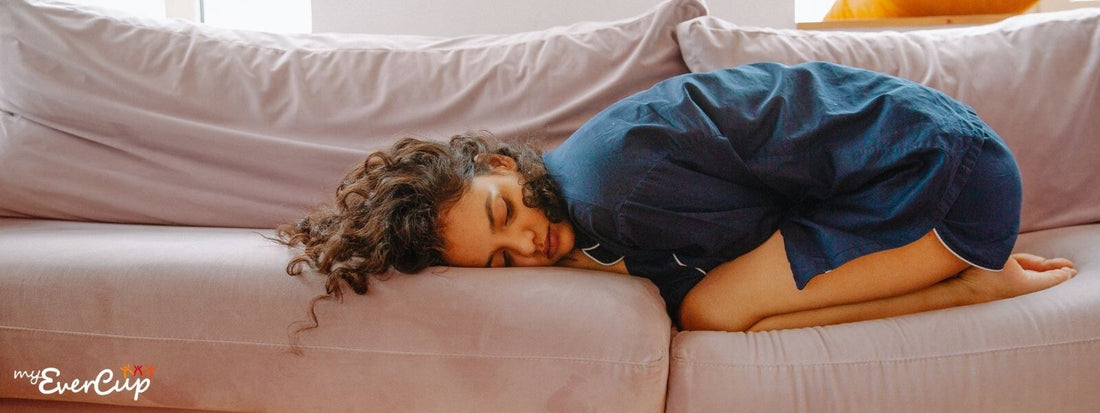How long does a period last and what is considered normal? Keeping track of your menstrual flow and cycle can help you better understand your symptoms, ovulation, and if and when you’re experiencing an irregular cycle. Answering, how long does a period last, varies between women based on genetics, birth control, age, personal menstrual cycle, and much more. Before we get started, here are a few takeaways:
Disclaimer: You know your body best. The following is not medical advice. If you believe you’re experiencing irregularities, please contact your physician.
3 Factors That Can Affect Menstruation Length and Heaviness
- How long does a period last? It can change month-to-month and as you age, modify your diet and change birth control. There are healthy guidelines for menstruation, but everybody is different. Your cycle and your friends’ will most likely differ.
- Birth control is one of the leading factors that may affect menstrual cycle changes. For instance, hormonal birth control may shorten it, while a copper IUD may do the opposite.
- A certain level of irregularity is normal. One study published in Best Practice & Research Clinical Obstetrics & Gynecology found that between 14% and 25% of women have irregular cycles. This can mean a shorter period or heavier/lighter flow between months.
What Is Menstruation?
Menstruation is the monthly process during which a woman’s body prepares itself for the possibility of pregnancy.
When most women ask, how long does a period last, they are referencing the number of days a month when they bleed, rather than the menstrual cycle on a whole. However, it’s important for women to understand this biological process holistically.
During this process, the ovaries will release an egg. If that egg is not fertilized, the uterine lining—also called the endometrium—will shed through the vagina. The blood and lining that is discharged through the cervix and vagina is your menstrual cycle.
Keep in mind that the first day of bleeding is typically the first day of your menstrual cycle. If you're wondering, can you get pregnant on your period, check out our guide.
4 Phases of Your Menstrual Cycle
Though menstruation only happens once a month, there is a lot that happens within a woman's body leading up to that point. The menstrual cycle—the duration between the first day of one cycle and the first day of the next—is divided into several phases.
On average, the menstrual cycle lasts 21 to 35 days, while bleeding will typically last between 2 and 7 days. However, the length of your cycle can vary, as can the length of vaginal bleeding.
- Follicular Phase: This phase starts on the first day of the menstrual cycle. During the follicular phase, the ovaries produce follicles. This is where a woman’s eggs are later stored. At the same time, a woman’s uterine lining will thicken.
- Ovulation: The next phase to understand when asking, how long does a period last, is ovulation. This is when the body releases a mature egg. It travels from the fallopian tube to the uterus approximately a couple weeks into the menstrual cycle.
- Luteal Phase: The body releases more hormones, including estrogen and progesterone as it prepares for pregnancy. If the egg isn’t fertilized, the body will begin menstruation.
- Menstruation: When the body releases the uterine lining and eggs.
How Long Does a Period Last on Average?
Typically it will last between 2 and 7 days. The length of her cycle varies between 21 and 35 days, according to the National Institute of Health. There are many reasons for these variations. Here are a few of the most common.
Want to know more about your own cycle? Some women suggest trying out a period tracker app to better understand ovulation, PMS and so much more.
6 Factors that Impact How Long a Period Lasts
Why is your period is heavier or lighter this month? Why is it a few days late or early? How come you’re experiencing spotting in between? There are a lot of reasons that may contribute to menstrual cycle inconsistency. Here are a few of the most common.
Birth Control
One of the biggest catalysts for change in a woman’s cycle is birth control. This can take the form of an IUD, birth control pills, or a vaginal ring. Wondering how long does a period last after going on a new form of contraception?
That answer could change between the early days of taking new birth control and three months later. In some cases, hormonal IUDs may shorten menstruation. By contrast, the copper IUD may lengthen it.
It is possible for a woman to experience abnormally long periods at the start of taking a new form of birth control. It is common to return to a more consistent cycle after a few months, though consult your doctor if you have further questions.
Age Affects How Long a Period Lasts
It is natural for a woman’s cycle to shift as she ages. Here’s a brief outline of what a woman may expect to happen at a certain age:
- Menarche: The time when a girl first starts menstruating is called menarche. In this stage, irregularity is most common. Typically, as girls age, their cycles become more consistent, but some degree of irregularity is always possible.
- Adult: How long does a period last? For adult women, it’s typically between 2 and 7 days. Most women will experience a heavier flow during the first couple of days.
- Menopause: The time in a woman’s life when she has gone 12 months without menstruation. In the years preceding menopause, a woman may experience some degree of irregularity again.
Pregnancy
Of course, missing menstruation can indicate pregnancy. Breastfeeding may also impact how long a period lasts. See a physician for more information.
Biological Factors that May Affect How Long a Period Lasts
How long does a period last and why can yours differ from month to month? There are a few biological factors that may impact how long a period lasts. These include:
- Weight Loss: Losing an excessive amount of weight can shorten the length of menstruation. Eating disorders, such as anorexia, may also contribute to shorter or even non-existent menstrual flow.
- Exercise: Similarly, exercising excessively may reduce the length of menstruation.
- Stress: Anxiety can also affect menstrual regularity.
If you have any questions or concerns that you are experiencing any of these, please seek medical advice from your doctor.
When Does a Long Period Need Medical Attention?
If you have any questions about your health, whether it's about the length of menstruation or otherwise, it's best to see a qualified physician. Though irregular menstrual cycles are commonplace, it's crucial to speak with a gynecologist if you have questions about birth control, hormonal fluctuations, and pregnancy.
What Qualifies as Heavy Bleeding?
You know your body best. If bleeding is heavier than what you typically experience, seek medical health. More generically, the American College of Obstetricians and Gynecologists define heavy bleeding as:
- Requiring more than one pad at a time
- Requiring pad changes during the night
- Menstruating blood clots that are larger than a quarter
- Bleeding for over 7 days.
- Soaking through one pad or tampon every hour repeatedly.
If one or more of the above symptoms is prompting you to ask, how long does a period last, please seek medical attention.
What Could Cause Heavy Bleeding?
There are several reasons why you may be experiencing heavy bleeding, some of which are healthy and natural. Do not attempt to self-diagnose; seek the advice of a healthcare professional. Here are a few of the more serious medical conditions associated with heavy bleeding according to the American College of Obstetricians and Gynecologists. They advise seeking an ob-gyn in many of these cases:
- Birth control, specifically the copper IUD during the first year of use
- Irregular ovulation
- Endometriosis
- Fibroids or polyps
- Cancer
- Adenomyosis
- Ectopic pregnancy
- Miscarriage
How Long Does a Period Last? It Depends.
The average period lasts between 2 and 7 days. A woman’s menstrual cycle may vary between 21 and 35 days. In these windows, there is significant room for irregularity, especially when you factor in a woman’s age, health, lifestyle and so much more.
For many women, a menstrual cup is the answer to both heavy and light flow days. It’s comfortable, healthful and easy, no matter the length of your cycle.

